Xujuan Zhou
Enhancing Suicide Risk Detection on Social Media through Semi-Supervised Deep Label Smoothing
May 09, 2024Abstract:Suicide is a prominent issue in society. Unfortunately, many people at risk for suicide do not receive the support required. Barriers to people receiving support include social stigma and lack of access to mental health care. With the popularity of social media, people have turned to online forums, such as Reddit to express their feelings and seek support. This provides the opportunity to support people with the aid of artificial intelligence. Social media posts can be classified, using text classification, to help connect people with professional help. However, these systems fail to account for the inherent uncertainty in classifying mental health conditions. Unlike other areas of healthcare, mental health conditions have no objective measurements of disease often relying on expert opinion. Thus when formulating deep learning problems involving mental health, using hard, binary labels does not accurately represent the true nature of the data. In these settings, where human experts may disagree, fuzzy or soft labels may be more appropriate. The current work introduces a novel label smoothing method which we use to capture any uncertainty within the data. We test our approach on a five-label multi-class classification problem. We show, our semi-supervised deep label smoothing method improves classification accuracy above the existing state of the art. Where existing research reports an accuracy of 43\% on the Reddit C-SSRS dataset, using empirical experiments to evaluate our novel label smoothing method, we improve upon this existing benchmark to 52\%. These improvements in model performance have the potential to better support those experiencing mental distress. Future work should explore the use of probabilistic methods in both natural language processing and quantifying contributions of both epistemic and aleatoric uncertainty in noisy datasets.
DE-CGAN: Boosting rTMS Treatment Prediction with Diversity Enhancing Conditional Generative Adversarial Networks
Apr 25, 2024Abstract:Repetitive Transcranial Magnetic Stimulation (rTMS) is a well-supported, evidence-based treatment for depression. However, patterns of response to this treatment are inconsistent. Emerging evidence suggests that artificial intelligence can predict rTMS treatment outcomes for most patients using fMRI connectivity features. While these models can reliably predict treatment outcomes for many patients for some underrepresented fMRI connectivity measures DNN models are unable to reliably predict treatment outcomes. As such we propose a novel method, Diversity Enhancing Conditional General Adversarial Network (DE-CGAN) for oversampling these underrepresented examples. DE-CGAN creates synthetic examples in difficult-to-classify regions by first identifying these data points and then creating conditioned synthetic examples to enhance data diversity. Through empirical experiments we show that a classification model trained using a diversity enhanced training set outperforms traditional data augmentation techniques and existing benchmark results. This work shows that increasing the diversity of a training dataset can improve classification model performance. Furthermore, this work provides evidence for the utility of synthetic patients providing larger more robust datasets for both AI researchers and psychiatrists to explore variable relationships.
Clustered FedStack: Intermediate Global Models with Bayesian Information Criterion
Sep 20, 2023Abstract:Federated Learning (FL) is currently one of the most popular technologies in the field of Artificial Intelligence (AI) due to its collaborative learning and ability to preserve client privacy. However, it faces challenges such as non-identically and non-independently distributed (non-IID) and data with imbalanced labels among local clients. To address these limitations, the research community has explored various approaches such as using local model parameters, federated generative adversarial learning, and federated representation learning. In our study, we propose a novel Clustered FedStack framework based on the previously published Stacked Federated Learning (FedStack) framework. The local clients send their model predictions and output layer weights to a server, which then builds a robust global model. This global model clusters the local clients based on their output layer weights using a clustering mechanism. We adopt three clustering mechanisms, namely K-Means, Agglomerative, and Gaussian Mixture Models, into the framework and evaluate their performance. We use Bayesian Information Criterion (BIC) with the maximum likelihood function to determine the number of clusters. The Clustered FedStack models outperform baseline models with clustering mechanisms. To estimate the convergence of our proposed framework, we use Cyclical learning rates.
PDRL: Multi-Agent based Reinforcement Learning for Predictive Monitoring
Sep 20, 2023Abstract:Reinforcement learning has been increasingly applied in monitoring applications because of its ability to learn from previous experiences and can make adaptive decisions. However, existing machine learning-based health monitoring applications are mostly supervised learning algorithms, trained on labels and they cannot make adaptive decisions in an uncertain complex environment. This study proposes a novel and generic system, predictive deep reinforcement learning (PDRL) with multiple RL agents in a time series forecasting environment. The proposed generic framework accommodates virtual Deep Q Network (DQN) agents to monitor predicted future states of a complex environment with a well-defined reward policy so that the agent learns existing knowledge while maximizing their rewards. In the evaluation process of the proposed framework, three DRL agents were deployed to monitor a subject's future heart rate, respiration, and temperature predicted using a BiLSTM model. With each iteration, the three agents were able to learn the associated patterns and their cumulative rewards gradually increased. It outperformed the baseline models for all three monitoring agents. The proposed PDRL framework is able to achieve state-of-the-art performance in the time series forecasting process. The proposed DRL agents and deep learning model in the PDRL framework are customized to implement the transfer learning in other forecasting applications like traffic and weather and monitor their states. The PDRL framework is able to learn the future states of the traffic and weather forecasting and the cumulative rewards are gradually increasing over each episode.
AI enabled RPM for Mental Health Facility
Jan 20, 2023

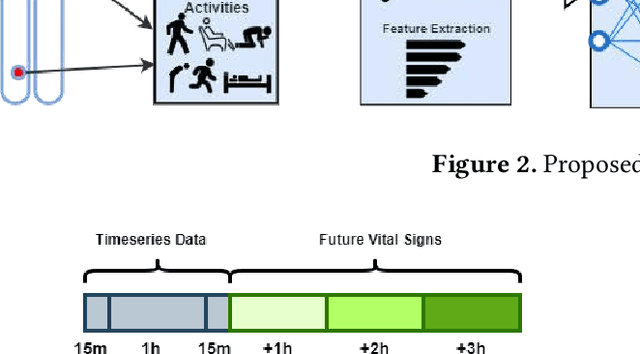
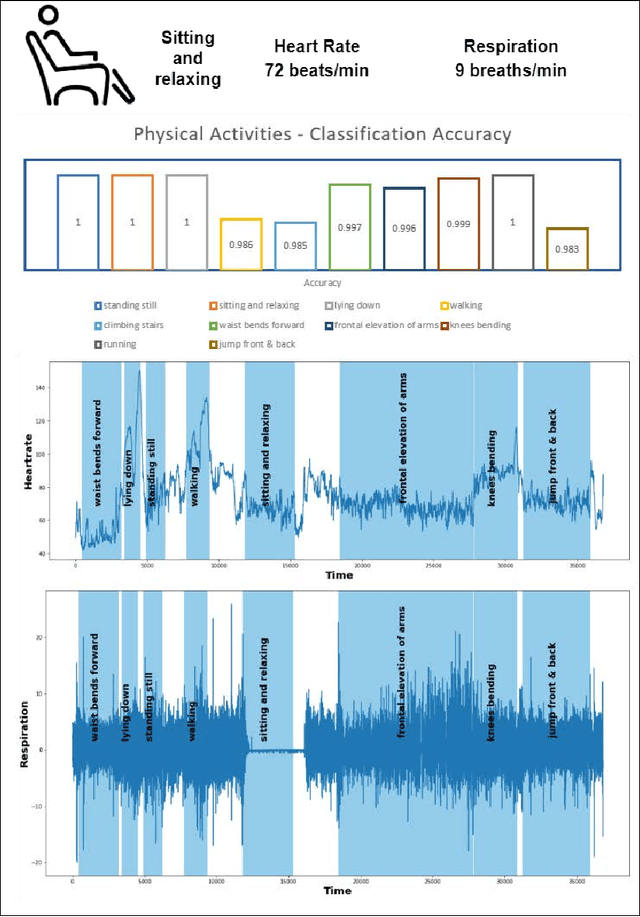
Abstract:Mental healthcare is one of the prominent parts of the healthcare industry with alarming concerns related to patients depression, stress leading to self-harm and threat to fellow patients and medical staff. To provide a therapeutic environment for both patients and staff, aggressive or agitated patients need to be monitored remotely and track their vital signs and physical activities continuously. Remote patient monitoring (RPM) using non-invasive technology could enable contactless monitoring of acutely ill patients in a mental health facility. Enabling the RPM system with AI unlocks a predictive environment in which future vital signs of the patients can be forecasted. This paper discusses an AI-enabled RPM system framework with a non-invasive digital technology RFID using its in-built NCS mechanism to retrieve vital signs and physical actions of patients. Based on the retrieved time series data, future vital signs of patients for the upcoming 3 hours and classify their physical actions into 10 labelled physical activities. This framework assists to avoid any unforeseen clinical disasters and take precautionary measures with medical intervention at right time. A case study of a middle-aged PTSD patient treated with the AI-enabled RPM system is demonstrated in this study.
Remote patient monitoring using artificial intelligence: Current state, applications, and challenges
Jan 19, 2023Abstract:The adoption of artificial intelligence (AI) in healthcare is growing rapidly. Remote patient monitoring (RPM) is one of the common healthcare applications that assist doctors to monitor patients with chronic or acute illness at remote locations, elderly people in-home care, and even hospitalized patients. The reliability of manual patient monitoring systems depends on staff time management which is dependent on their workload. Conventional patient monitoring involves invasive approaches which require skin contact to monitor health status. This study aims to do a comprehensive review of RPM systems including adopted advanced technologies, AI impact on RPM, challenges and trends in AI-enabled RPM. This review explores the benefits and challenges of patient-centric RPM architectures enabled with Internet of Things wearable devices and sensors using the cloud, fog, edge, and blockchain technologies. The role of AI in RPM ranges from physical activity classification to chronic disease monitoring and vital signs monitoring in emergency settings. This review results show that AI-enabled RPM architectures have transformed healthcare monitoring applications because of their ability to detect early deterioration in patients' health, personalize individual patient health parameter monitoring using federated learning, and learn human behavior patterns using techniques such as reinforcement learning. This review discusses the challenges and trends to adopt AI to RPM systems and implementation issues. The future directions of AI in RPM applications are analyzed based on the challenges and trends
FedStack: Personalized activity monitoring using stacked federated learning
Sep 27, 2022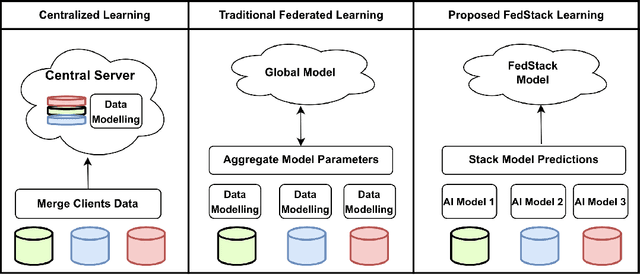
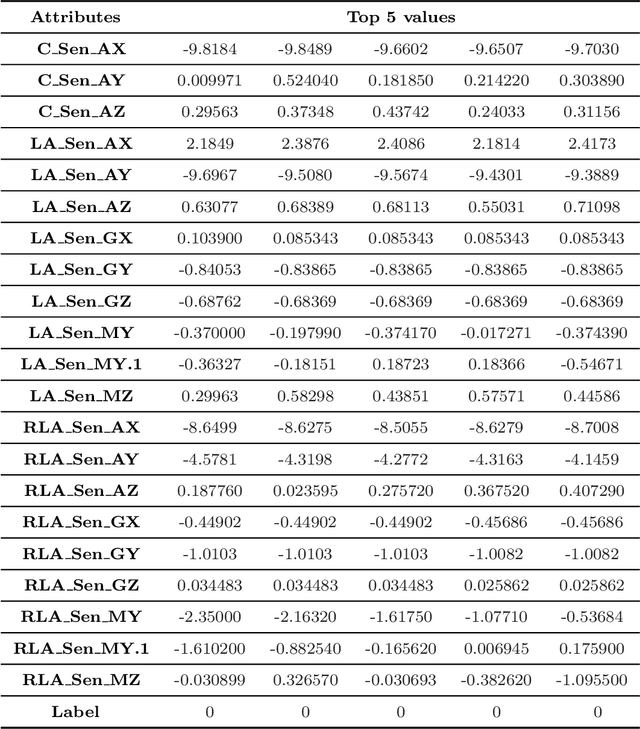

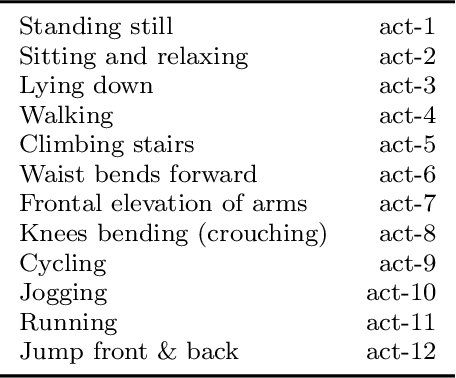
Abstract:Recent advances in remote patient monitoring (RPM) systems can recognize various human activities to measure vital signs, including subtle motions from superficial vessels. There is a growing interest in applying artificial intelligence (AI) to this area of healthcare by addressing known limitations and challenges such as predicting and classifying vital signs and physical movements, which are considered crucial tasks. Federated learning is a relatively new AI technique designed to enhance data privacy by decentralizing traditional machine learning modeling. However, traditional federated learning requires identical architectural models to be trained across the local clients and global servers. This limits global model architecture due to the lack of local models heterogeneity. To overcome this, a novel federated learning architecture, FedStack, which supports ensembling heterogeneous architectural client models was proposed in this study. This work offers a protected privacy system for hospitalized in-patients in a decentralized approach and identifies optimum sensor placement. The proposed architecture was applied to a mobile health sensor benchmark dataset from 10 different subjects to classify 12 routine activities. Three AI models, ANN, CNN, and Bi-LSTM were trained on individual subject data. The federated learning architecture was applied to these models to build local and global models capable of state of the art performances. The local CNN model outperformed ANN and Bi-LSTM models on each subject data. Our proposed work has demonstrated better performance for heterogeneous stacking of the local models compared to homogeneous stacking. This work sets the stage to build an enhanced RPM system that incorporates client privacy to assist with clinical observations for patients in an acute mental health facility and ultimately help to prevent unexpected death.
 Add to Chrome
Add to Chrome Add to Firefox
Add to Firefox Add to Edge
Add to Edge